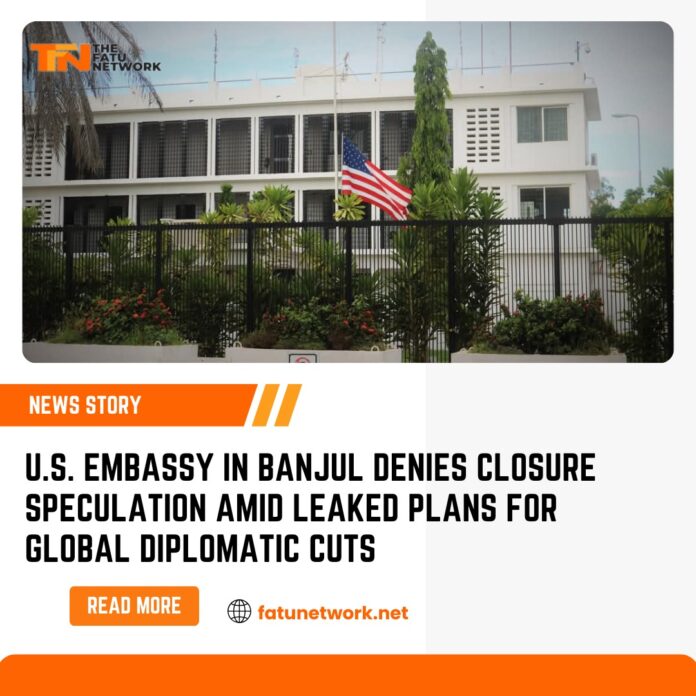By Hadram Hydara
The U.S. Embassy in Banjul has dismissed rumours of its impending closure, even as a confidential State Department memo obtained by The New York Times reveals broader plans by the Trump administration to shutter 10 embassies and 17 consulates worldwide, including in six African nations, among them The Gambia.
According to the April 15 report, the undated proposal seeks to consolidate diplomatic operations in fragile regions like Africa, redirecting responsibilities to larger regional hubs. For The Gambia, this would mean closing its sole U.S. embassy in Banjul and merging services into a neighbouring mission, likely in Senegal. The memo frames the closures as cost-cutting measures, aligning with President Trump’s push to slash foreign aid and reduce America’s diplomatic footprint abroad.
Andrew Posner, the embassy’s Public Affairs Officer in Banjul, told The Fatu Network: “No embassy or consulate closures have been announced, and operations continue as normal,” adding that the State Department routinely evaluates its global posture to “address modern challenges on behalf of the American people.”
The leaked document, however, has heightened anxieties about long-term U.S. disengagement. Hassan Hydara, an Italian-based Gambian with a Master’s degree in World Politics and International Relations, warned that closing the embassy would strain bilateral ties and empower rivals.
“The expense of visa applications for Gambians would rise as they would have to journey to Senegal or another country to apply for a U.S. visa,” Hydara told The Fatu Network. “It would restrict diplomatic interactions, collaborative efforts, and reform initiatives in security sector reforms, governance, and other key projects, including NGOs and civil society groups funded by the U.S. embassy in Banjul,” he added.
He warned that relocating services to Dakar—over 300 kilometres away—would burden U.S. citizens requiring consular assistance and erode Washington’s influence.
“The U.S. would jeopardise its considerable diplomatic influence in [The] Gambia to competing nations like China and Russia,” he said.
Hydara argued that The Gambia, unlike larger African economies, lacks the clout to resist consolidation. “Unfortunately, The Gambia lacks significant leverage or strategic benefit, aside from cultural connections as an English-speaking former British colony — [factors] largely unattractive to this economy-focused U.S. administration,” he said.
He suggested negotiating “a U.S. military base” to anchor American interests.
“I would encourage the authorities to consider difficult but prudent measures, such as strategically negotiating the establishment of a U.S. military base in The Gambia to reinforce U.S. interests in order to have U.S. embassy in Banjul remained open,” he added— a proposal likely to spark debate in a nation sensitive to foreign military presence.
Hydara noted the suggestion of a military base might be contentious, but said geopolitics relies on pragmatism, not idealism and without tangible leverage, such steps may be necessary to keep the embassy open.
Fatou Baldeh MBE, a prominent women’s and human rights activist, echoed concerns about the embassy’s strategic value. “I am very concerned about the speculation regarding the potential closure of the U.S. Embassy in The Gambia,” she told The Fatu Network. “The embassy is very significant here because we are a country with weak systems and institutions, particularly given our history of authoritarian rule.
Baldeh highlighted security risks, noting that while The Gambia is not part of the Sahel, its proximity to the region makes it vulnerable. “My fear is that the embassy’s closure could open space for extremism, affecting the region and, by extension, the U.S. itself. For example, without the embassy, The Gambia might become a training ground for extremists, with impacts reaching beyond our borders—even to the U.S.”
She also emphasized the embassy’s role in fostering cross-cultural ties. “It has enabled Gambians to participate in exchange programs to understand U.S. culture, while U.S. citizens have come here to learn about ours and take that back to their country. These programs, which we’ve greatly benefited from, risk disappearing if the embassy shuts down.”
When contacted by The Fatu Network about the potential closure and its implications for bilateral relations, Lang Yabou, Permanent Secretary at The Gambia’s Ministry of Foreign Affairs, declined to comment. “… At the moment, it would not be in order for me to say anything about this subject matter,” Yabou stated.
The State Department has also not addressed the memo’s specifics, and no final decisions have been announced. Analysts note the plan reflects a broader Trump-era shift toward austerity, despite bipartisan criticism that embassy closures weaken U.S. crisis response and cede ground to adversaries like Russia’s Wagner Group, active in nearby Mali and the Central African Republic.
The Gambia, under President Adama Barrow, has sought stronger Western ties since rejoining the Commonwealth in 2018 and pursuing democratic reforms post-dictatorship. The U.S. Embassy, established in 1965, has been pivotal, issuing visas to Gambians and supporting governance and security projects.
Yet the leaked memo underscores the vulnerability of smaller nations amid U.S. strategic recalibrations. “Consolidating missions risks leaving partners feeling abandoned,” said Morro Sillah. “It’s a gift to powers like China, who’ll gladly fill the void.”
For many Gambians, the embassy’s value is practical. “Speculation helps no one,” said Lamin Ceesay. “This mission’s presence matters greatly—not just for visas, but partnerships our communities rely on.”
Others rejected Hydara’s military base idea. “Inviting foreign troops would betray the whole idea of sovereignty,” said Ebrima Colley. “We can’t trade dignity for convenience.”




